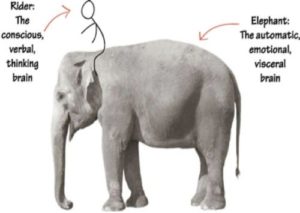 Natasha Helfer Parker and Lisa Butterworth, both mental health professionals, have a rich discussion about the role of both emotion and logic when it comes to how we think through positions we take, beliefs we have and communication styles we engage with others on. This is particularly relevant in understanding dynamics relating to faith transitions, political differences, racial and other types of discrimination and differing moral priorities. We tend to make assumptions that we think and behave from a place of critical thought and self-awareness. Not so much. Emotion and subconscious factors play huge roles in motivation for movement towards anything we lean into. So can we trust our critical thinking processes? Can we trust our emotions? Are we really justifying after all? Natasha and Lisa delve into how understanding that both of these human traits are pivotal towards individual and relational growth helps us have more empathy for self and others.
Natasha Helfer Parker and Lisa Butterworth, both mental health professionals, have a rich discussion about the role of both emotion and logic when it comes to how we think through positions we take, beliefs we have and communication styles we engage with others on. This is particularly relevant in understanding dynamics relating to faith transitions, political differences, racial and other types of discrimination and differing moral priorities. We tend to make assumptions that we think and behave from a place of critical thought and self-awareness. Not so much. Emotion and subconscious factors play huge roles in motivation for movement towards anything we lean into. So can we trust our critical thinking processes? Can we trust our emotions? Are we really justifying after all? Natasha and Lisa delve into how understanding that both of these human traits are pivotal towards individual and relational growth helps us have more empathy for self and others.
Lisa Butterworth, LPC, NCC has a masters degree in Clinical Mental Health Counseling from Idaho State University, primarily working with issues of relational health, faith transitions and journeys, women’s issues and sexuality. She is the founder of the popular Feminist Mormon Housewives website and support group and currently works at Symmetry Solutions.
The Happiness Hypothesis by Jonathan Haidt
The Righteous Mind by Jonathan Haidt
Thinking Fast and Slow by Daniel Kahneman
Natasha Helfer Parker, LCMFT, CST runs an online practice, Symmetry Solutions, which focuses on helping families and individuals with faith concerns, sexuality and mental health. She writes at The Mormon Therapist for Patheos: Hosting the Conversation of Faith, runs Mormon Sex Info and is the current president for the Mormon Mental Health Association.
Podcast: Play in new window | Download